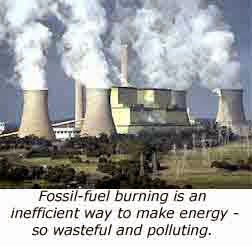Melbourne Herald Sun, Thursday April 30, 2015
For some years now I have been rather relaxed about carbon targets and pollution measures promised or denied by industries and governments. These figures, "5 per cent", "20 per cent", "50 per cent" - what do they really mean when we need to change the entire globe's choking pollution?
No, I'm relaxed because the solution is on its way, more quickly than we think. Because in a few decades' time our greatest problem will be gone: we will no longer be burning fossil fuels for energy and power.
Coal will continue to burn for steel making and other industrial purposes, but not to generate electricity in the inefficient and polluting way it is now. Oil will be used to make engines run smoothly, but not burned for fuel. What a waste.
For decades, already, we have been generating power with solar cells and wind and waves. Water of course has provided power from waterfalls and dams for a century and more.
Photovoltaic cells are gaining in efficiency by leaps and bounds, with thousands of research and development groups around the world pushing the percentages ever higher.
But the weakest link has always been storage. How do you keep an ephemeral force like electric power, in a box until you need it?
Batteries are bulky, heavy, expensive and slow to recharge. For the power needed to run a car, lead-acid batteries are inadequate. But in the past decade a lot of work has been done with lithium-ion batteries for cars and mobile phones. Huge amounts of money are being poured into research which is progressing rapidly.
The most publicised of the new batteries are those coming from US car manufacturer Tesla. Just this week, they will launch two new domestic batteries. That's right, the famous Tesla li-ion batteries, adapted for your home. So if yours is a renewable energy house, the gaps in sun or wind can be filled by the powerful, long-lasting battery.
Is this a serious threat to fossil fuels? Well when it speculated, last month, about making an announcement soon - Tesla's market capitalisation jumped by more than one billion dollars, overnight. So yes, it's serious.
Together with allied panel-maker SolarCity, Tesla chief executive Elon Musk is building a vast US "gigafactory" set to open in 2017. Tesla's lithium-ion batteries will be manufactured here. Plus the new domestic units.
These are planned as a package, which will give your home the PV units and a storage battery for around $18 a month. Your home will be fully powered, 24/7. Who needs a coal-fired station and skies full of power lines?
The race to build a better battery is going full-tilt. Here in Australia, a Monash University team is working on microscopic capacitors mounted on atom-thick graphene sheets. These they predict, will be able to hold many times more energy than even the li-ion batteries. It's been predicted that these two battery types, working in tandem, could give a car 900K range.
If you've seen the Tesla, and its performance figures, you'll know that it is a long way from a golf buggy. In fact once you're moving all you'll miss is the roar of pistons and the plumes of exhaust smoke. Who needs petrol?
I clearly see a fossil-free future ahead. Maybe not in my lifetime, but not long after. Meanwhile the benefits will flow in, incrementally. My only worry is our modern-day Luddites, out to smash the machines and cripple the horses. Unfortunately a lot of them are in the government.

